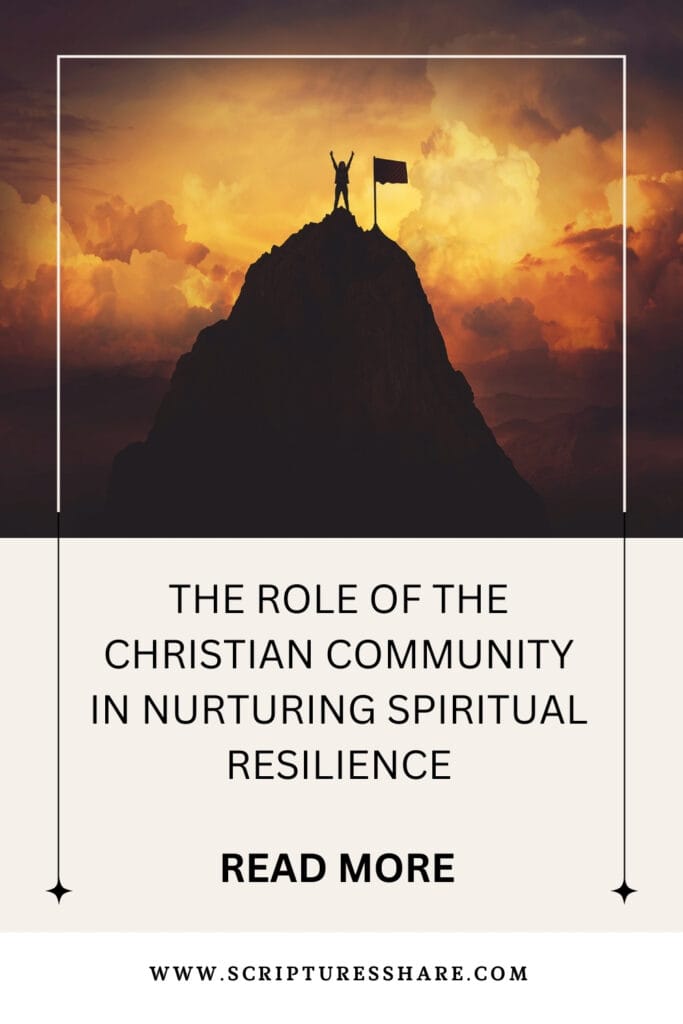No products in the cart.
The Role of the Christian Community in Nurturing Spiritual Resilience
This post contains paid and/or affiliate links. I make a small commission at no extra cost to you. Please see our Privacy Policy.
The Christian community plays a key role in nurturing spiritual resilience. Our faith journey often faces tough times that test our strength. But, the Christian community offers guidance, support, and strength to help us through these challenges.
Spiritual resilience is the base of our resilience in life. It helps us stay grounded, find hope, and keep our connection with God strong. The Christian community is vital in building this resilience, giving us a place to seek comfort, encouragement, and wisdom.
In the company of fellow believers, we find people who understand our struggles. Together, we learn from each other’s victories over adversity. Through prayer, worship, and shared devotion, the Christian community helps our faith grow and flourish.
“Carry each other’s burdens, and in this way, you will fulfill the law of Christ.”
– Galatians 6:2
Within the Christian community, we find mentors and leaders who guide us. They offer wisdom and support on our faith journey. Their teachings strengthen our spiritual resilience. They remind us of the power of prayer, the importance of faith, and God’s comforting presence in our lives.
In conclusion, the Christian community is essential in nurturing spiritual resilience on our faith journey. Their guidance, support, and the interconnectedness of believers give us the strength to face challenges with unwavering faith and hope. Let’s explore how the Christian community supports post-disaster recovery and how spirituality and resilience work together in times of crisis.
The Impact of Community Support in Post-Disaster Recovery
The power of community support, mainly from the Christian community, is immense after a disaster. The journey to recovery is long and hard, but with the support of those around us, we can find strength, hope, and resilience.

When disaster hits, people and families are left shaken by the physical, emotional, and psychological damage. The Christian community offers safety, security, and comfort during these tough times. They play a key role in post-disaster recovery by providing practical help like shelter, food, medical aid, and emotional support through prayer, counseling, and fellowship.
“Though one may be overpowered, two can defend themselves. A cord of three strands is not quickly broken.”
– Ecclesiastes 4:12
Here are some ways in which community support, mainly from the Christian community, impacts post-disaster recovery:
- Providing a Strong Foundation: The Christian community is a solid base for individuals and families to rebuild their lives. Community members help create stability and normalcy through their love, compassion, and guidance.
- Fostering a Sense of Belonging: In times of crisis, feeling isolated is common. But the Christian community gives a sense of belonging, reminding us we’re not alone. This togetherness gives us a renewed sense of purpose and motivation to overcome adversity.
- Empowering Resilience: The support and encouragement from the Christian community help us tap into our inner strength and resilience. Community members inspire and motivate us to persevere by sharing stories of triumph over tragedy.
- Offering Emotional Healing: The Christian community provides a safe space for individuals to express their emotions, process their grief, and find solace. Through prayer groups, support circles, and counseling services, community members help those struggling with emotional wounds, facilitating healing and emotional well-being.
When we come together as a Christian community to support each other after a disaster, we create a network of resilience. This network enables individuals and families to overcome their challenges.
The impact of such community support goes beyond physical and material help—it fosters hope, strength, and renewal.
Spirituality and Resilience in Times of Crisis
In times of crisis, spirituality plays a key role. It helps people find inner strength and coping skills. This connection between spirituality and resilience is based on faith and spiritual practices.
“Let us hold unswervingly to the hope we profess, for He who promised is faithful. And let us consider how we may spur one another on toward love and good deeds.”
– Hebrews 10:23-24
Spirituality gives us a sense of purpose and meaning. It offers hope and optimism, helping us stay positive. It also helps us understand and deal with tough times.
Practices like prayer, meditation, and reflection are great for our mental health. They help us reflect, discover ourselves, and take care of our minds. This way, we can find peace in chaotic times.
Also, spirituality connects us to a community. This sense of belonging and support is vital. It helps us feel less alone and more supported.
To grow resilient through spirituality, we can follow our beliefs. This might mean going to religious services or helping others. These actions help us stay strong and connected.
The bond between spirituality and resilience shows our inner strength. By nurturing our spirituality, we can face challenges head-on. We become stronger and more resilient.
The Interplay Between Family, Faith, and Mental Health
This section looks at how family, faith, and mental health are connected. These areas deeply impact our lives and well-being.
Family support is essential for our mental health. They give us love, stability, and help us through tough times. This support is key for our mental well-being.
Our faith also plays a big role in our mental health. It gives us hope, purpose, and strength. It helps us find meaning and cope with stress.
The Role of Family in Mental Health:
- A family support system offers emotional and practical help, promoting good mental health.
- Good family relationships and communication provide security, trust, and understanding.
- Unconditional love and acceptance from family members boost our self-esteem and self-worth.
The Influence of Faith in Mental Health:
- Our faith can be a source of comfort, hope, and resilience during hard times.
- Spiritual practices like prayer and meditation can improve our emotional well-being.
- Faith communities offer a sense of belonging, support, and shared values, reducing loneliness.
Challenges and Balance:
Finding a balance between family, faith, and personal freedom can be tough. It’s important to communicate openly and respect each other’s beliefs and boundaries.
“As iron sharpens iron, so one person sharpens another.”
– Proverbs 27:17
In conclusion, the connection between family, faith, and mental health is clear. Embracing family support and faith can greatly improve our well-being. By communicating openly and finding balance, we can thrive in these relationships.
Nurturing Resilience Through Open Communication and Self-Care
To build resilience, we must value open communication and self-care. These practices help us create a supportive environment. They promote understanding, support, and growth.
The Importance of Open Communication
Open communication is key to building resilience in families. It makes a safe space for sharing thoughts and feelings. This way, family members can support each other through tough times.
Also, open communication helps talk about faith and mental health openly. This removes the shame around these topics. It lets us offer the right support and guidance to our loved ones.
The Power of Self-Care
Self-care is also vital for resilience. We need to take care of our physical, emotional, and spiritual health. This helps us deal with life’s challenges.
Self-care can be many things. It includes exercise, mindfulness, hobbies, and setting boundaries. These activities help us feel better and stronger.
A Holistic Approach to Resilience
Resilience grows when we care for our whole selves. This means looking after our physical, emotional, and spiritual health. By doing this, we build a strong foundation for ourselves and our families.
- Start by focusing on physical health with exercise and good food.
- Work on emotional health by being aware of your feelings and seeking help when needed.
- For spiritual health, pray, meditate, or do things that make you feel connected.
This holistic approach helps us and our families to overcome hard times. It builds lasting resilience.
Conclusion
The Christian community plays a big role in building spiritual resilience. This article has shown how they support people in tough times. Their support is very important.
In hard times, the Christian community offers hope and strength. Their faith helps people feel supported and understood. Family, faith, and mental health are all connected in building resilience.
As we finish this article, we see how important the Christian community is. They help people find the strength to face challenges. Their support can change lives. We must value their role in helping us grow spiritually.
In summary, the Christian community is essential for spiritual resilience. They provide support, guidance, and a sense of belonging. This helps people overcome obstacles and grow in their faith. We should appreciate their role in nurturing our spiritual well-being.
FAQ
How does the Christian community contribute to nurturing spiritual resilience?
The Christian community is crucial in nurturing spiritual resilience by providing guidance, support, and strength in the faith journey. Their teachings and fellowship offer a sense of belonging, encouragement, and inspiration.
In what ways does the Christian community support post-disaster recovery?
The Christian community provides vital support in post-disaster recovery by offering safety, security, and assistance in rebuilding and healing. They come together to provide resources, aid, and a sense of community to those affected, helping them to restore their lives and find comfort during challenging times.
How can spirituality help individuals in times of crisis?
Spirituality can give individuals the strength, hope, and guidance to navigate challenging situations. Faith and spiritual practices offer comfort, solace, and a sense of purpose, helping individuals cope with adversity and find meaning in their experiences.
How does the interplay between family, faith, and mental health impact resilience?
The interplay between family, faith, and mental health shapes resilience. Strong family support, a foundation of faith, and attention to mental well-being enhance an individual’s ability to bounce back from challenges. These interconnected aspects of life provide stability, love, and understanding, nurturing resilience and overall well-being.
Why are open communication and self-care important for nurturing resilience?
Open communication within families allows for discussing faith and mental health, promoting understanding, and meeting individual needs. It creates a supportive environment where individuals can freely express their struggles and seek guidance. Incorporating self-care practices, such as adopting a holistic approach to wellness, including physical, emotional, and spiritual aspects, further strengthens resilience and fosters overall well-being.











